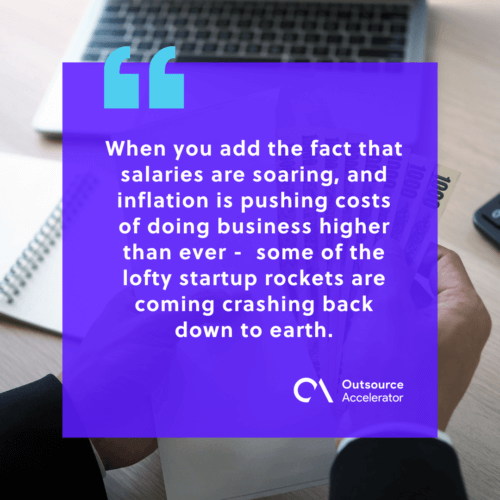Startups falter as VC funding dries up
As VC’s tighten funding, many companies are finding that they are left with dwindling cash reserves, and less ability to raise funding.
In startup-world, things work a bit differently to normal businesses. Real businesses subscribe to profit and market feedback, while startups subscribe to growth-at-all-cost and exhilarating burn rates. Normal businesses earn money and feedback from their customers, whereas start-ups earn their money and validation from VC funding rounds.
In the current climate of VCs tightening their belts, and reduced funding appetite, many startups are faced with dwindling cash reserves, and difficulty raising next-round funding.
When you add the fact that salaries are soaring, and inflation is pushing costs of doing business higher than ever – some of the lofty startup rockets are coming crashing back down to earth.

Recently, an online checkout solution called “Fast” collapsed after it was unable to raise another funding round. The company, founded in only 2019, had successfully burned through $125m of cash. Thats 125m… dollars! Real money. Not Monopoly money. The company had reportedly burned through $10m per month for the last 12 months. They were also reportedly able to generate just $600,000 top line revenue during this period. That’s worth repeating…
The spent $125m to generate only $600,000 in sales.
To generate that $50k monthly revenue, they employed over 250 staff. That’s a revenue ratio of just $200 per staff member per month. The company probably would have earned more money if they asked each of their staff to setup a lemonade stand on the weekends…
The 34-year old founder, Domm Holland, said that most of the $10m monthly spending went on his staff salaries.
Are you ‘default alive’?
Paul Graham, the revered Y-Combinator founder in 2015 wrote a blog suggesting that startups should assess whether they are “default alive”, or “default dead”. In simple PG-speak, this means you are either cash flow positive (ie default alive), or are you burning cash and reliant on external sources of funding (ie default dead).
If you are unable to cover your costs internally, then you are reliant on the whims of the VC industry – and that can be expensive money.
As VC funding starts to tighten more companies should work to ensure that they are default alive. Or… at least that they are dropping their burn rate and extending their runway.
How to extend your runway
One of the best ways to extend your runway is to drop your costs. And when staffing costs typically account for 50%-70% of startup company spending, the salaries you pay are a critical factor.
With offshore staffing, you can save 70% on costs. That means that a developer might be $30k-$60k per year, instead of $100k-$200k…. That’s a big difference!
And there are great developers in the Philippines. There are also great marketers, accountants, product managers, sales directors. You can all kinds of highly capable professionals in the Philippines. Including CMOs, CTOs, COOs, CROs and CFOs… You can save about 70% on all of these roles.

Sourcing great staff globally, instead of locally is a real option. And it is a fantastic way of extending your runway and conserving cash. It’s worth considering.
The question for your business:
Could you benefit from extending your runway, conserving cash, or making more profit?

 Independent
Independent





















